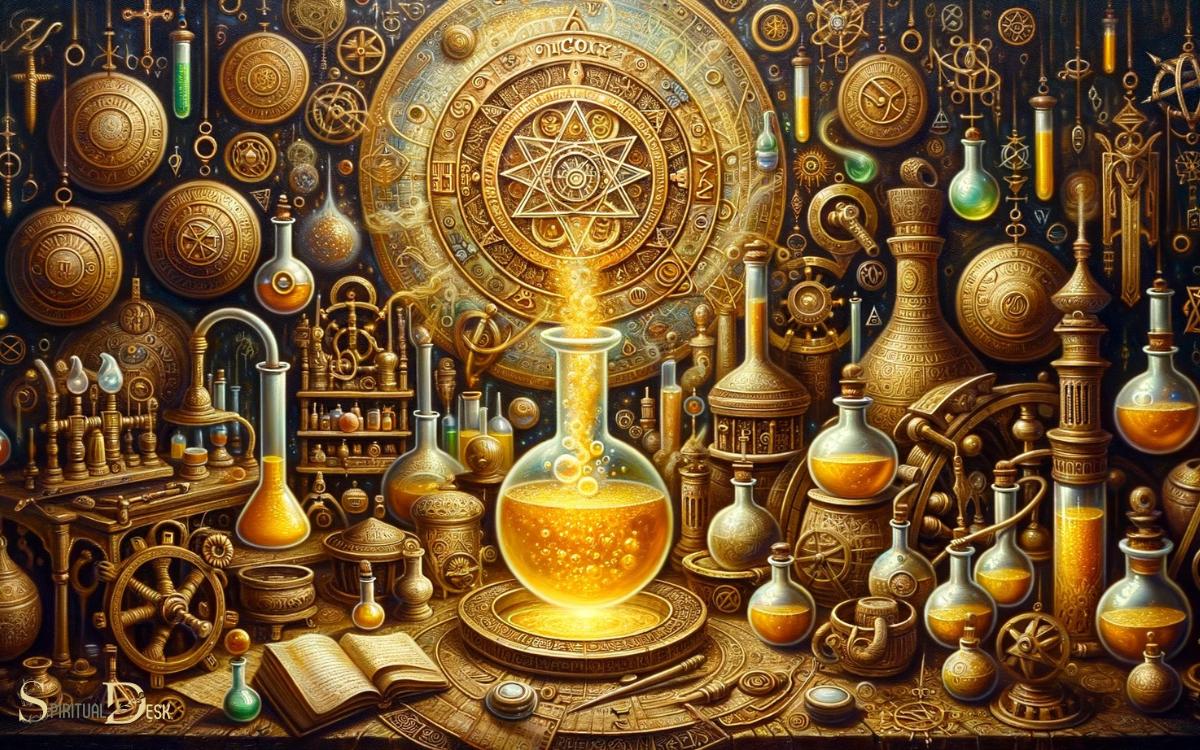What is the Spiritual Meaning of Alchemy? Purification!
The spiritual meaning of alchemy is the pursuit of personal transformation and enlightenment. It involves the symbolic application of alchemical processes to the soul’s journey, aiming to purify and perfect the individual’s spiritual essence.
This inner alchemy is often associated with achieving a higher state of consciousness and connecting with the divine.
Alchemy, traditionally known for its attempts to transform base metals into gold, also encompasses a deep spiritual philosophy.
It represents the transformation of the self, mirroring the physical processes of purification, dissolution, and coagulation with stages of spiritual enlightenment.
An example of this is the concept of turning ‘lead,’ representing the base human soul, into ‘gold,’ symbolizing an enlightened and divine state.
Embarking on the alchemical path signifies a quest for deeper wisdom and a more profound connection with the universe, transcending beyond physical matter into the realm of the spirit.

Key Takeaway
7 Spiritual Alchemy Stages Spiritual Meaning
| Spiritual Alchemy Stage | Description |
|---|---|
| Calcination | This represents the stage of spiritual enlightenment where ego and attachment to materialistic things are destroyed. |
| Dissolution | This stage reflects the process of dissolving the ego and our false beliefs. It allows us to let go of our constraints and explore the hidden depths of our subconscious mind. |
| Separation | This phase involves the identification and separation of thoughts that are deeply embedded in the unconscious mind. The process aids in discarding the outdated. |
| Conjunction | It symbolizes the empowerment of our true self, where we integrate and harmonize the opposite aspects of our being. |
| Fermentation | It involves transformation and rebirth. It represents the transition from a life lead by materialistic desires to a spiritual one. |
| Distillation | This stage involves the refinement and purification of our inner self to reach a higher state of purity and spirituality. |
| Coagulation | This is the final stage of spiritual alchemy, which symbolizes achieving long-lasting transformation and enlightenment. It represents the evolution of true wisdom and an enlightened mind. |
Origins of Spiritual Alchemy
The origins of spiritual alchemy can be traced back to ancient civilizations and philosophical traditions.
Ancient Egyptian, Greek, and Chinese cultures all contributed to the development of alchemical practices.
These early alchemists sought to understand the nature of existence, the universe, and the human soul.
They believed that through the transformation of base materials, such as lead, into more refined substances, like gold, they could also achieve spiritual enlightenment and inner purification.
Alchemy was deeply intertwined with spiritual and philosophical pursuits, aiming to uncover the mysteries of life and the universe.
This quest for understanding led to the development of intricate symbolic language and rituals, which became central to the practice of spiritual alchemy.
Understanding the symbols and their meanings is crucial to grasping the depth of alchemical knowledge and wisdom.
Symbols and Their Meanings
The symbols used in alchemy carry significant meanings, often representing deeper philosophical and spiritual concepts.
Understanding the interpretations of these alchemical symbols can provide insight into the hidden symbolism within the practice of alchemy.
Exploring the various symbols and their meanings can shed light on the profound wisdom embedded in the art of spiritual alchemy.
Alchemical Symbol Interpretations
Alchemical symbols carry profound meanings rooted in the principles of transformation and spiritual enlightenment.
These symbols are rich with interpretations that delve into the depths of the human psyche and the mysteries of the universe.
Some key alchemical symbols and their meanings include:
- The Ouroboros: Represents the cycle of life, death, and rebirth, as well as the unity of opposites.
- The Philosopher’s Stone: Symbolizes spiritual illumination, the perfection of the soul, and the transformation of base elements into gold.
- The Caduceus: Signifies healing, balance, and the integration of opposites, reflecting the alchemical union of the masculine and feminine principles.
These symbols serve as powerful tools for contemplation and meditation, guiding individuals on their journey towards inner alchemy and self-realization.
Hidden Symbolism in Alchemy
Exploring the hidden symbolism in alchemy reveals a multitude of intricate symbols and their profound meanings, offering deeper insights into the transformative and spiritual aspects of this ancient practice.
Alchemical symbols are rich with hidden meanings, each representing various elements, stages, and concepts within the alchemical process.
Below is a table showcasing some of the key alchemical symbols and their associated meanings:
| Symbol | Meaning |
|---|---|
| The Ouroboros | Infinity, cycle of life and death |
| The Philosopher’s Stone | Spiritual illumination, enlightenment |
| The Three Primes | Basic elements: salt, sulfur, mercury |
| The Caduceus | Integration of opposites, balance |
| The Sun and Moon | Union of masculine and feminine energies |
These symbols serve as a visual language, conveying the intricate spiritual and transformative aspects of alchemy.
Transitioning into the subsequent section about ‘the inner alchemical process’, it is crucial to understand how these symbols intertwine with the practitioner’s inner journey towards spiritual enlightenment.
The Inner Alchemical Process
During the inner alchemical process, individuals undergo a profound transformation of the self at a spiritual level.
This process involves several key aspects:
Self-Reflection and Awareness:
- Individuals engage in deep introspection to understand their inner workings and motivations.
- They cultivate mindfulness to become more aware of their thoughts, emotions, and behaviors.
Integration of Opposing Elements:
- Embracing and reconciling internal conflicts and contradictions, such as the balance between the conscious and unconscious mind.
- Harmonizing polarities within oneself, such as masculine and feminine energies, to achieve inner unity.
Transmutation of the Soul:
- Purification of the soul through moral and ethical refinement, leading to spiritual growth and enlightenment.
- The conversion of inner darkness and negativity into wisdom, compassion, and understanding.
This inner alchemical process is a profound journey of self-discovery and spiritual evolution.
Alchemical Transmutation and Transformation
In the spiritual practice of alchemy, the process of transmutation and transformation holds significant meaning.
This aspect of alchemy encompasses the idea of spiritual evolution and the symbolic representation of inner change.
Understanding the symbolism of transmutation is essential to grasp the spiritual significance of alchemical practices.
Spiritual Evolution Through Alchemy
Spiritually, alchemical transmutation and transformation occur gradually as practitioners diligently apply the principles of alchemy to their inner growth and development.
This spiritual evolution through alchemy involves several key aspects:
Inner Work: Practitioners engage in deep introspection and self-reflection, confronting their inner conflicts and shadows to achieve personal growth.
- Shadow Integration: The process of acknowledging and integrating repressed or hidden aspects of the self, leading to a more holistic and balanced psyche.
- Soul Purification: Purging impurities from the soul through introspection, meditation, and spiritual practices, leading to inner clarity and harmony.
Consciousness Expansion: As alchemical principles are applied, practitioners experience an expansion of consciousness, transcending limitations and gaining deeper spiritual insight.
- Mindfulness: Cultivating present-moment awareness to enhance spiritual growth and transformation.
- Connection to the Divine: Seeking unity with the divine through spiritual practices and inner alchemical work.
Symbolism of Transmutation
The symbolism of transmutation in alchemy encapsulates the profound process of inner change and spiritual transformation.
It represents the journey of the soul from a state of spiritual impurity and ignorance to one of enlightenment and purity.
Alchemical transmutation is not merely the literal transformation of base metals into gold; it signifies the inner transformation of the alchemist, seeking spiritual perfection and union with the divine.
This symbolism is deeply rooted in the belief that through the process of inner transmutation, one can attain spiritual elevation and wisdom.
Alchemical transformation involves the purification of the soul, shedding the impurities of ego and material desires to attain a higher state of consciousness.
It is a metaphor for the spiritual journey towards self-realization and the attainment of spiritual enlightenment.
Alchemy in Spiritual Practices
Alchemy plays a significant role within various spiritual practices throughout history and continues to be utilized in modern spiritual traditions.
Its presence in spiritual practices can be seen through:
- Inner Transformation: Alchemy is used as a metaphor for the inner transformation of the individual, symbolizing the journey of self-discovery and personal growth.
- Meditative Practices: Alchemical symbolism and principles are integrated into meditation practices to facilitate inner transformation and spiritual awakening.
- Rituals and Ceremonies: In some spiritual traditions, alchemical rituals and ceremonies are performed to symbolize the purification and transformation of the soul.
These practices demonstrate how alchemy serves as a powerful tool for spiritual development, guiding individuals through the process of inner transmutation and spiritual evolution.
The Relevance of Alchemy Today
In contemporary society, alchemy continues to hold relevance as a philosophical and spiritual framework for understanding personal transformation and inner growth.
The principles of alchemy, such as transmutation and the union of opposites, offer valuable insights into the process of psychological and spiritual development.
Moreover, the alchemical concept of the philosopher’s stone as a symbol of enlightenment and the quest for spiritual perfection resonates with individuals seeking meaning and purpose in their lives.
| Key Aspect | Relevance Today |
|---|---|
| Personal Transformation | Offers a framework for inner growth and self-discovery |
| Psychological Healing | Provides insights into the integration of the psyche |
| Spiritual Enlightenment | Symbolizes the pursuit of higher consciousness |
| Symbolism | Offers rich metaphors for understanding human nature |
Conclusion
The spiritual significance of alchemy lies in its:
- Ancient origins
- Symbolic representations
- The inner process of transformation
- Relevance in modern spiritual practices
Alchemy offers a profound pathway for individuals to embark on an inner alchemical journey, leading to transmutation and transformation.
Its timeless teachings provide a treasure trove of wisdom for those seeking to unlock the mysteries of the soul and attain spiritual enlightenment.
FAQ About The Spiritual Meaning Of Alchemy?
What Is The Spiritual Meaning Of Alchemy?
The spiritual meaning of alchemy is the transformation of the soul and the pursuit of enlightenment through self-exploration and inner alchemical processes.
How Does Alchemy Connect To Spiritual Growth?
Alchemy connects to spiritual growth by symbolizing the journey of self-transformation and the integration of the mind, body, and spirit in the pursuit of higher consciousness.
What Are The Key Principles Of Alchemy In Spirituality?
The key principles of alchemy in spirituality include transmutation, purification, unity, balance, and the realization of one’s true nature.
Can Alchemy Help In Personal Development?
Yes, alchemy can help in personal development by providing tools and practices for inner work, self-reflection, and spiritual growth.






